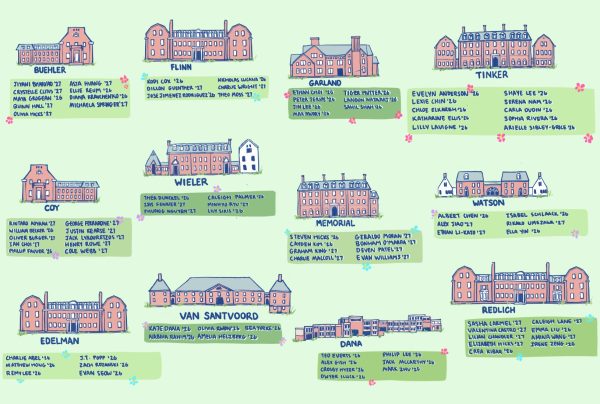Peer Listeners Offer an Open Door
You have probably heard about the Peer Listeners Committee (PLC) and received its emails, but you might not be entirely sure what it is. When did it start? What does it do? These are all questions Peer Listeners heads Luke Kalaydijan ’20 and Anne Seaman ’20 can answer, having founded the group last year with Sue Lee ’19. They said, “The purpose of the PLC is to promote trust amongst peers by establishing a space where students feel heard and validated.”
The PLC is made up of Upper Mids and Seniors who have received training from Health Center counselors and devote their time to listen to fellow students. Two listeners are open for meetings every night from 7 to 9 p.m. in room 308 in the Language Wing. They are there for students to talk to about anything, ranging from conflicts with friends to poor grades.
Some may wonder how these students differ from counselors at the Health Center. According to Kalaydjian and Seaman, Peer Listeners are not authorized to give professional advice, whereas counselors have extensive backgrounds that permit them to do so. Speaking to fellow students has its own benefits, however, in that peers can oftne better relate to certain issues, having had similar experiences. They explained, “There is value in making someone feel validated and heard by just understanding what they have to say, [which] is sometimes more valuable than giving advice. Peer Listeners go through training to learn how to become empathetic and validating listeners.”
Kalaydjian, Lee, and Seaman initiated the program to create a resource that students might find less intimidating than a trip to the Health Center. By entrusting students in the community to act as resources for peers, the Peer Listeners Committee also seeks to strengthen a sense of school-wide unity and foster new connections between students.
The Listeners are required to keep content from their sessions private and will face disciplinary consequences if they fail to uphold this commitment; however, if students share information that suggests they need serious help – such as details about substance abuse, self-harm, harm to others, and sexual assault – listeners must seek outside assitance for the student from the Health Center.
Listeners generally see between zero and four students per session. Kalaydijan and Seaman understand that some students might not feel comfortable talking to a peer they see in the halls and that other resources may be more fitting for some students, including proctors, advisors, faculty members in the Teaching and Learning Center (TLC), Human Development Teaching Assistants (HDTAs), and Health Center counselors. Kalaydjian reminds students, “Any adult in the Hotchkiss community is happy to help with any sort of issue going on your life. No matter what’s going on, there [are] always people to support [you who] care about you.”
Kalaydjian and Seaman encourage the community to reach out to them with questions at [email protected] and [email protected].




